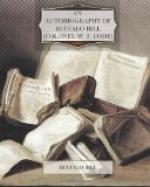Alf Slade, stage-line superintendent, frontiersman, and dare-devil fighting man, was one of the far-famed gunmen of the Plains. These were a race of men bred by the perils and hard conditions of Western life. They became man-killers first from stern necessity. In that day the man who was not quick on the trigger had little chance with the outlaws among whom he had to live. Slade and “Wild Bill,” with both of whom I became closely associated, were men of nerve and courage. But both, having earned the reputation of gun-fighters, became too eager to live up to it. Eventually both became outlaws.
Slade, though always a dangerous man, and extremely rough in his manner, never failed to treat me with kindness. Sober, he was cool and self-possessed, but never a man to be trifled with. Drunk, he was a living fury. His services to the company for which he worked were of high value. He was easily the best superintendent on the line. But his habit of man-killing at last resulted in his execution.
Another man who gained even greater notoriety than Slade was “Wild Bill” Hickock, a tall, yellow-haired giant who had done splendid service as a scout in the western sector of the Civil War.
“Wild Bill” I had known since 1857. He and I shared the pleasure of walking a thousand miles to the Missouri River, after the bull-train in which we both were employed had been burned by Lot Smith, the Mormon raider. Afterward we rode the Pony Express together.
While an express rider, Bill had the fight with the McCandless gang which will always form an interesting chapter in the history of the West.
Coming into his swing station at Rock Creek one day, Bill failed to arouse any one with his shouts for a fresh mount. This was a certain indication of trouble. It was the stock-tender’s business to be on hand with a relief pony the instant the rider came in. The Pony Express did not tolerate delays.
Galloping into the yard, Bill dismounted and hurried to the stable. In the door he saw the stock-tender lying dead, and at the same instant a woman’s screams rang from the cabin near by. Turning about, Bill found himself face to face with a ruffian who was rushing from the house, brandishing a six-shooter. He asked no questions, but pulled one of the two guns he carried and fired. No sooner had the man fallen, however, than a second, also armed, came out of the house. Hickock disposed of this fellow also, and then entered the place, where four others opened a fusillade on him.
Although the room was thick with smoke, and Bill had to use extreme care to avoid hitting the woman, who was screaming in the corner, he managed to kill two of his assailants with his revolvers and to ward off a blow with a rifle a third had leveled at him.
The blow knocked the weapon from his hand, but his knife was still left him, and with it he put the man with the rifle out of the way. His troubles were not at an end, however. Another man came climbing in the window to avenge his fellow gangsters. Bill reached for a rifle which lay on the floor and shot first.




